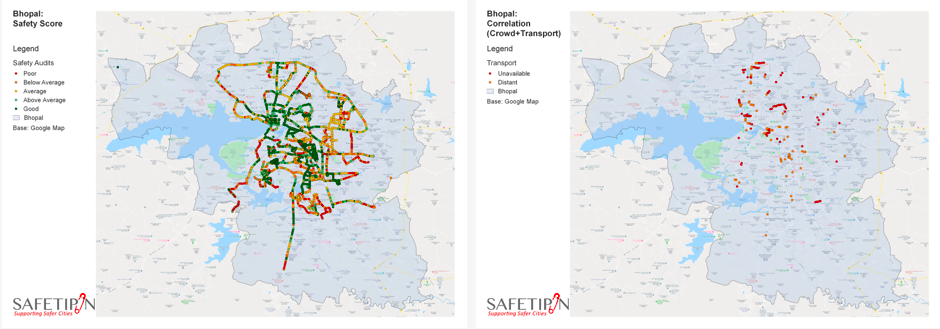Case STUDY- BHOPAL

Safetipin works in tier-2 cities as well as the last few years have witnessed the organisations and stakeholders who have come forth to address the challenges in the metropolitan cities like Delhi, Bangalore posed by rapid urbanisation but when it comes to tier-2 cities then there is a scary silence. The pace of urbanisation is not lagging in tier two cities as well, so bringing along the challenges of mobility and safety of its citizens and especially women. This is why the study in the city of Bhopal began in 2015 in partnership with WRI Cities Ross with an effort to study/assess the women safety in public transport. Data was collected by using Safetipin app in and around the specific bus stops and corridors. As data on harassment and eve teasing are highly underreported, safety audits acted as a valuable proxy in understanding the perception of people and greatly help in getting a better idea of the situation on- ground.
In 2017 another round of audits were done using the Safetipin application in collaboration with UN Women, WRI India and a local partner named Sangini- Gender Resource Centre to assess the infrastructure of the city which can further inform the aspect of the safety for women in the city.
In 2018-19 Bhopal was studied again from the perspective of mobility of women in the city is partnership with The Asia Foundation. The study was a part of bigger three city study project (Bhopal, Jodhpur and Gwalior). This project intended to address the issue of lack of safety and fear that women face in public spaces while moving around the cities through data collection and building capacities of local governments to address these concerns. In total 247 kms were covered with 3198 audit points throughout the city. The data generated was shared with the city authorities and key urban stakeholders to intervene in terms of upgrading the city infrastructure. Along with the audits done by using mobile applications, this time there were many focussed group discussions done with the transport users and transport providers to bring out a qualitative survey for getting in depth information and data about the safety concerns of the city.. The data which was generated was analysed further to produce two documents titled ‘Women Friendly Transport- A case Study of Bhopal Gwalior and Jodhpur’ and ‘Guidelines for an Index on Gender Friendly Cities’.

